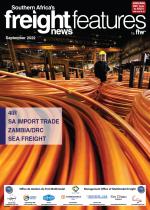Beyond the obstacles sparked by the pandemic, importers continue to face a host of disruptions as global supply chains remain under pressure.According to Michelle Horner, trade manager at SACO CFR, importers are increasingly looking to source goods and materials from alternative suppliers. “This has been partly to circumvent regions heavily impacted by Covid-19 lockdowns, but also to deal with the numerous production and transport challenges in the current market environment – not to mention the shipping line service routing amendments we are seeing,” she told Freight News.With LCL volumes on the increase, neutral consolidators are seeing the need for f luidity in service offerings and the need to offer importers alternative routings for cargo to optimise cargo handling and transit times. “Alternatives to loading and discharge ports and regions have become essential to meet the needs of our clients,” says Horner. “While maintaining our core LCL services into South Africa, it is vital to work closely with one’s clients to identify routing and service needs, and in turn, to then develop solutions for importers ensuring the most effective movement of cargo into the country.”According to Horner, while volumes are on a positive trajectory at the moment, importers are facing numerous challenges. “LCL volumes are on the rise, but there is no denying the real obstacles importers are having to deal with. The South African rand continues to see f luctuating rates of exchange, carrier services remain erratic with capacity an ongoing concern, while global port congestion and delays continue unabated.”This is all exacerbated by ongoing pandemic-related lockdowns, especially in the Far East. “In these times it has been beneficial to be part of a global network such as the World Wide Alliance as it provides cost-effective and time-efficient cargo consolidation services from all around the world, allowing our clients and importers to source goods and cargo from any region as needed.”Innovative solutions and access to a variety of consolidation services are important for South African importers as time and cost are probably the two biggest challenges they face.“Traditionally, importers were able to place cargo orders for ‘ just in time delivery’, as trade services into South Africa were regular and moved within published transit times. This has changed over the past few years as a direct result of the global pandemic, further impacted by the Russia/Ukraine war,” explains Horner. “As global port congestion continues, along with road and rail transport challenges and reduced shipping line services into South Africa, cargo lead times and transit times have increased exponentially. As a result, importers are having to secure cargo orders earlier than needed for production and/or resale, which has a direct impact on shipment payment terms as well as business liquidity and cash f low.”Horner says while freight rates have somewhat stabilised, they remain higher than ever before.“The demand for capacity remains high, and although we have not seen the expected surge of cargo as traditionally experienced for the peak season, carriers have maintained the need for optimised utilisation of vessel capacity. Freight rates from the Far East have softened slightly in the past few months, however European services remain at premium rates, with surcharges being impacted by the high cost of bunker-related charges.”

